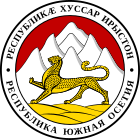|
2012 South Ossetian presidential election
Presidential elections were held in South Ossetia on 25 March 2012, with a second round on 8 April.[1] The election selected the first president since the country gained partial international recognition.[2] BackgroundThe date was set by the parliament after the 2011 election was annulled by the Supreme Court after Alla Dzhioyeva was disqualified following allegations of electoral violations by Anatoly Bibilov.[2] A deal was reached on 9 December 2011 under which the incumbent Kokoity stepped down at the end of his mandate and was replaced by Prime Minister Vadim Brovtsev as acting president.[3] Though Dzhioyeva was previously barred from running again, she was allowed to register in the re-run of the election. However, Kokoity and his supporters reneged on parts of the deal,[which?] calling into question the stability of the compromise.[4] CandidatesNo candidate participating in the 2011 election registered, including the previous leaders Dzihoyeva and Bibilov. There were four registered candidates:[5]
Dzhioyeva did not register to run in the election after she was in hospital with allegations of being beaten and held against her will.[6] Another candidate from 2011, Georgiy Kabisov, attempted to register twice, but both times was rejected by the central election commission.[7] Yuri Dzitssuty, the vice-speaker of Parliament, attempted to register as a candidate. However, he was rejected by the central election commission due to "irregularities" in the 500 signatures he collected.[8] CampaignTibilov and Sanakoyev disagreed with former President Eduard Kokoity who said that South Ossetia would eventually be a part of Russia. Sanakoyev said: "In November–December [2011], it became very clear that those supported by Kokoity did not win. Everyone saw it."[2] Opinion pollA week before the election, an opinion poll by the IR media centre suggested Medoyev or Tibilov would win.[9] MonitorsIn addition to Russian observers the election commission said that it would call on the Council of Europe.[10] ResultsWith 40% of the votes counted, Tibilov was in the lead with 42.5% of the votes, Sanakoyev followed with 24.6%[11] of the votes, Medoyev was third with 23.80% of the votes and Kochiyev trailed with 5.62% of votes counted.[12] First round turnout was over 65%, with expatriate voting still to be counted.[13] Without an absolute winner the election was set for a run off.[11] The second round occurred on Easter with 84 voting centres opening at 8:00 for the 35,000 registered voters.[6] The preliminary result with 95.64% of the ballots counted, indicated Tibilov winning with 53.74%, or 15,257, of the votes, with Sanakoyev getting 42.98%, or 12,272, of the votes.[14]
ReactionsAfter the first round, Tibilov said that "today's figures show that my candidacy is taken normally. Let's hope the second round confirms this." He also denied having Russian backing, but said that he would consult Russia in choosing his new government.[2]
References
|
|||||||||||||||||||||||||||||||||||||||||||||||||||||||||||||||||||||||||||||||||||||||||||||||||||||||||||||||||||||||||||||||||||||
Portal di Ensiklopedia Dunia


